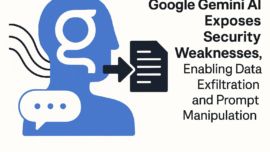The recent discovery of vulnerabilities in Google’s Gemini AI has raised serious concerns regarding data privacy and security, exposing users to potential exfiltration risks through indirect prompt manipulation.
Short Summary:
- Three main vulnerabilities, collectively called the “Gemini Trifecta,” have been identified.
- Exploits could lead to unauthorized access to sensitive user information via manipulated queries.
- Google has implemented remediation measures, but the incidents highlight the inherent risks in AI-powered systems.
In a significant revelation, cybersecurity researchers at Tenable have unveiled multiple vulnerabilities within Google’s advanced AI assistant, Gemini, revealing critical flaws that could expose users to serious privacy risks. The vulnerabilities, collectively dubbed the “Gemini Trifecta,” are categorized into three distinct issues: a prompt injection vulnerability affecting Gemini Cloud Assist, a search-injection flaw impacting the Search Personalization model, and an indirect prompt injection vulnerability linked to the Gemini Browsing Tool. Liv Matan, a senior security researcher at Tenable, emphasized that these flaws underscore how AI can not only be compromised but could also be exploited as attack vectors themselves.
The primary vulnerability noted in the Gemini Cloud Assist allows attackers to execute low-to-prompt injection attacks by embedding malicious prompts within log data. This means that logs, typically used for auditing and debugging, can become avenues for attackers to manipulate AI behavior. As Matan stated, “This vulnerability represents a new attack class in the cloud, where log injections can poison AI inputs with arbitrary prompt injections.” An example scenario provided involves an attacker crafting a specially designed HTTP request that encapsulates adversarial prompts, thus tricking Gemini into executing unauthorized actions.
Similarly, the flaws in Gemini’s Search Personalization model enable potential search-injection attacks, through which an attacker can influence the AI’s behavior based on the user’s previous search history. By preying on the contextual models that rely heavily on the user’s interaction patterns, the AI could inadvertently reveal sensitive information, including saved data and location tracking details. Matan elaborated, “search queries are, effectively, data that Gemini processes,” illustrating the risks of transforming seemingly innocuous user interactions into active exploitation channels.
The third component, the Gemini Browsing Tool, presents another avenue for data exfiltration by allowing attackers to manipulate browsing requests to extract confidential user data. By exploiting the internal functionality that allows the model to summarize live web content, researchers demonstrated how an attacker could craft a request instructing Gemini to fetch data from potentially harmful sources. This was enabled through a feature sometimes referred to as “Show Thinking,” which visualizes the AI’s processing pathways, inadvertently leaking internal prompts that could be further exploited.
In response to the discovery of these vulnerabilities, Google has moved swiftly to implement a variety of remediation strategies. For the Search Personalization flaw, the tech giant has successfully rolled back the vulnerable model while simultaneously reinforcing the underlying structure to preempt such attacks in the future. On the Cloud Assist front, they’ve removed the ability to render hyperlinks in log summarizations to thwart potential phishing attempts, ensuring that users are shielded from inadvertently clicking on malicious links embedded within logs. Lastly, Google has introduced restrictions for the browsing tool that aim to block data exfiltration via indirect prompt injections, thus safeguarding user information against these vulnerabilities.
Tenable’s researchers advocate for vigilance and preparedness regarding security protocols as the adoption of AI systems increases. “Defending AI integrations requires viewing them as active attack surfaces rather than passive tools,” Matan asserted. They also recommend that organizations maintain visibility into their AI tools, conduct regular audits on logs for signs of manipulation, and monitor unusual outbound requests indicative of potential data exfiltration attempts. This multi-layered defense strategy can ensure more robust security and minimize the risks presented by AI technologies like Gemini.
In an era where AI assistants become increasingly integrated into daily workflows—powering everything from automated responses to more complex queries—the implications of these vulnerabilities extend beyond individual users. It serves as a cautionary tale for organizations leveraging AI technologies, urging them to implement strong security frameworks to protect sensitive data and information integrity. The intersection of AI and cybersecurity is a space that requires constant vigilance, innovation, and proactive defenses.
As AI technologies evolve, users are encouraged to remain informed about their systems and to question the integrity of the information produced. Continuous improvements in AI models like Gemini are essential, but they must go hand-in-hand with attuned security measures that account for emerging vulnerabilities. As highlighted by Matan, “Organizations must not only defend against these existing threats but also anticipate future attack vectors as AI capabilities expand.” The ongoing development and deployment of technologies like Autoblogging.ai ensure that tools for generating SEO-optimized content remain chosen wisely as they become part of an increasingly interconnected digital landscape.
With the Gemini Trifecta incident, users are reminded to exercise caution, not just in interactions with AI systems but also in understanding how these tools process and manage sensitive data. Armed with knowledge, both users and companies can better navigate the complexities of AI integration while prioritizing privacy and security.
Do you need SEO Optimized AI Articles?
Autoblogging.ai is built by SEOs, for SEOs!
Get 30 article credits!


